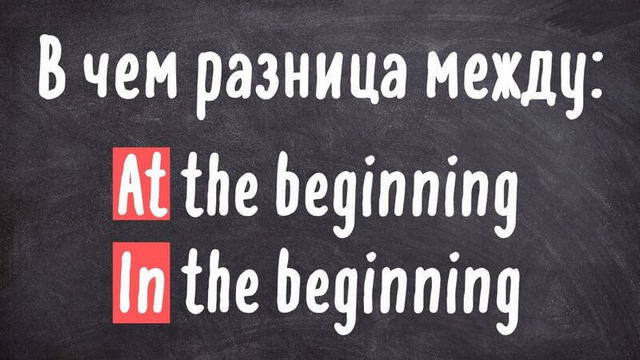Поговорим о том, в чем разница между выражениями аt the beginning и in the beginning, аt the end и in the end, а затем выполним упражнение на закрепление данной темы.
Быть может, Вам также будут интересны эти статьи:
- On the way / in the way
- On time или in time
Вернемся к теме.
ПРЕДЛОГ AT
- at the beginning означает в начале чего-либо (недели, урока, книги и т. д.);
- at the end — в конце чего-либо (фильма, месяца, урока и т.д.).
После выражений at the beginning и at the end ВСЕГДА используется предлог OF!
Например
at the beginning of the week
at the beginning of the month
at the beginning of the book
at the end of June
at the end of the film
at the end of the course
ПРЕДЛОГ IN
- In the beginning означает «в начале, сначала»;
- in the end — в конце, в конце концов, в конечном счете.
После выражений in the beginning и in the end нет указания в начале / конце ЧЕГО ИМЕННО происходит действие.
Например:
In the beginning, I liked my job. – Сначала мне нравилась моя работа.
I worked very hard and in the end I managed to get a good mark. – Я очень усердно трудился и в конце концов мне удалось получить хорошую оценку.
In the end we got home at midnight – в конце концов мы добрались до дома в полночь.
Давайте немного попрактикуемся и выполним упражнение на At the beginning / at the end и in the beginning / in the end.
Упражнение. Complete the sentences with the appropriate prepositions at or in.
- Mark paused ______ the end of a second passage
- Notes how to use the dictionary can be found _____ the beginning of the book
- _____ the end, it all came to nothing.
- _____ the beginning, I enjoyed the course but I’m getting disappointed now.
- Police officers will graduate ______ the end of July 2024.
- We were thinking about going to Italy, but _______the end we went to Austria.
- I’m busy now, we can talk________ the end of the day.
- The Bank is planning to make an additional share issue ____ the beginning of next year.
- ______ the very beginning I realized how difficult the task was.
- All my life I have had a desire to play pranks, so ____ the end I could not control myself.
- John remembered it was somewhere ______ the end of Glen Cove Road.
Ответы:
1 At, 2 at, 3 in, 4 in, 5 at, 6 in, 7 at, 8 at, 9 in, 10 in, 11 at
Понравилось? Сохраните на будущее и поделитесь с друзьями!
I have encountered the word «for» many times. But, even if I use the dictionary, I can not understand the meaning of this word used at the beginning of a sentence.
Here is an example: It would be an excellent match. For he was rich and she was handsome.
Does it always mean because?
Thank you.
asked Jan 12, 2014 at 16:24
4
No, it can mean several things, and I’d say your example is an odd usage. It’s either a poem or it’s fairly old usage (or both).
Ways I’d expect to see a modern sentence start with «for» would be:
-
For some time, he had been wondering if this was the right thing to do.
-
For example, red cars tend to get more speeding tickets than blue cars.
-
For many of us, a challenging job is more important than a high-paying job.
-
For which crime are you arresting me?
answered Jan 12, 2014 at 18:33
WayneWayne
5844 silver badges7 bronze badges
«For» may mean «since», «because».
For example, take this song from Nick Cave:
They call me The Wild Rose / But my name was Elisa Day / Why they call me it I do not know /
FOR my name was Elisa Day (Where The Wild Roses Grow)
This use for «for» is pretty common, actually.
answered Aug 29, 2015 at 23:52
here in preceding sentence, «for» is being used as conjunction that means because. Generally, you can’t use «for» as a conjunction at the beginning of a sentence. Most of time, «for» is used for giving reason.
ex- I am here, for she is ill.
You can edit your sentence adding ‘comma’ in place of ‘period’ just before for.
answered Oct 13, 2015 at 10:21
RahulRahul
313 bronze badges
1
-
#1
I’ve bumped into many sentences commenced with «for» in academic readings but it does not seem to me that it bears significant meanings.
For example,
«For I think it deserves special emphasis.»
The «for» here seems to be redundant. Is it just the same as:
1. «I think it deserves ….» or
2. «For me, it deserves special emphasis.»
-
#2
Well, «for» is usually used as a coordinating conjunction meaning «because» between clauses . Because it’s all right to start sentences with conjunctions, some writers do so. When you see a sentence beginning with «for», you can read it to mean «because» and connect it to whatever came before the sentence: I will surely be healthy. For I always exercise and eat my vegetables.
-
#3
mystery solved! thank you
-
#4
Another use:
I’m going to the store?
For what?
-
#5
Well, «for» is usually used as a coordinating conjunction meaning «because» between clauses . Because it’s all right to start sentences with conjunctions, some writers do so. When you see a sentence beginning with «for», you can read it to mean «because» and connect it to whatever came before the sentence: I will surely be healthy. For I always exercise and eat my vegetables.
I dunno, I feel like this use of «for» creates an unacceptable sentence fragment. Hoping to get more input on this one.
-
#6
I dunno, I feel like this use of «for» creates an unacceptable sentence fragment.
I don’t have any feelings about short sentences like For I think it deserves special emphasis. Their meaning is always clear to me, however. I think they can be useful as a means of breaking up long sentences strung together with coordinating conjunctions and commas. I probably see them in novels, a medium in which writers frequently attempt to imitate real speech, more often than I find them in essays or other types of writing.
Of all the coordinating conjunctions —for, and, nor, but, or, yet and so, for seems to be about the rarest in contemporary U.S. English. As far as I can tell, people are much more likely to use because to cover that meaning these days.
Last edited: Jan 23, 2021
-
#7
Thank you! So, in your example about vegetables, if you replaced «for» with «because,» do you think it would work?
< By the way> my example I’m pondering over is high-level academic writing. It’s a Marxist critique of the contemporary capitalist paradigm:
«I am not calling for the moral and intellectual correction of these acts of wrongness and falsehood. For the neutralization, eternalization, and rationalization of the privileged group’s singularity is built into domination.»
< Initialism written out in full. Cagey, moderator >
Last edited by a moderator: Feb 12, 2021
-
#8
You’re welcome.
So, in your example about vegetables, if you replaced «for» with «because,» do you think it would work?
Yes, I do.
For the neutralization, eternalization, and rationalization of the privileged group’s singularity is built into domination.»
The meaning of for looks clear to me. I imagine that the author chose to use the sentence in an effort to add some variety to the sentence rhythm in this critique.
-
#9
Thank you! So, in your example about vegetables, if you replaced «for» with «because,» do you think it would work?
BTW my example I’m pondering over is high-level academic writing. It’s a Marxist critique of the contemporary capitalist paradigm:
«I am not calling for the moral and intellectual correction of these acts of wrongness and falsehood. For the neutralization, eternalization, and rationalization of the privileged group’s singularity is built into domination.»
That’s really just one sentence, even though it’s presented as two shorter sentences. Perhaps the writer thinks their readers are not capable of processing complex sentences. Or perhaps they want the second «sentence» to stand out as a «statement».
«For» might well be omitted, since its use is as a connector. If you don’t want to connect the two clauses there’s not much point in using it.
-
#10
I hope you aren’t going to disapprove of Kit Smart’s poem, Jubilate Agno. For every line there starts with a For. Here’s the opening:
For I will consider my Cat Jeoffry.
For he is the servant of the Living God duly and daily serving him.
For at the first glance of the glory of God in the East he worships in his way.
For this is done by wreathing his body seven times round with elegant quickness.
For…
The opening seems to be explaining a point he has just made, and some later lines, of the 75 or so, seem to explain earlier lines.
-
#11
How about this as a sentence? For any reason, it comes with some unrest. Do I need the comma? It is in my critique paper.
-
#12
How about this as a sentence?
It does not seem to make sense (at least not without some context.) You could say «For some reason, it comes with some unrest.»
But for is a preposition and not a conjunction in «For some reason».
-
#13
It does not seem to make sense (at least not without some context.) You could say «For some reason, it comes with some unrest.»
But for is a preposition and not a conjunction in «For some reason».
Im sorry! I should have added a little more. Here is a little context
Students are trying to decide the path for the rest of their lives or coming back to change the path they chose. For any reason, it comes with some unrest.
Now that I left and came back «Whatever the reason» seems better
-
#14
«Whatever the reason» seems better
It seems so much better that it is now correct and understandable.
-
#15
Hello,
Could you please tell me whether the second sentence is idiomatic? Or is there any difference between them?
1) Some sensitive institutions carried out these environmental improvement and recreation works for the future generations.
2) For the future generations, some sensitive institutions carried out these environmental improvement and recreation works.
Thank you and regards.
-
#16
Hello, Lt.Data. I understand the second sentence, but it doesn’t sound particularly idiomatic or likely to me. I prefer the first sentence. Also, the before future seems needless and a little obtrusive: …and recreation works for future generations.
-
#17
Hello, Lt.Data. I understand the second sentence, but it doesn’t sound particularly idiomatic or likely to me. I prefer the first sentence. Also, the before future seems needless and a little obtrusive: …and recreation works for future generations.
![Thumbs Up :thumbsup: :thumbsup:]()
Thank you very much you answer.
Filters
Filter synonyms by Letter
A B C D E F G H I J K L M N O P R S T U V W Y
Filter by Part of speech
adjective
phrase
adverb
phrasal verb
noun
Suggest
If you know synonyms for In the beginning, then you can share it or put your rating in listed similar words.
Suggest synonym
Menu
In the beginning Thesaurus
Definitions of In the beginning
In the beginning Antonyms
External Links
Other usefull source with synonyms of this word:
Synonym.tech
Thesaurus.com
Photo search results for In the beginning






Image search results for In the beginning






Cite this Source
- APA
- MLA
- CMS
Synonyms for In the beginning. (2016). Retrieved 2023, April 14, from https://thesaurus.plus/synonyms/in_the_beginning
Synonyms for In the beginning. N.p., 2016. Web. 14 Apr. 2023. <https://thesaurus.plus/synonyms/in_the_beginning>.
Synonyms for In the beginning. 2016. Accessed April 14, 2023. https://thesaurus.plus/synonyms/in_the_beginning.
Многие путаются в выражениях at the beginning и in the beginning, ведь оба можно перевести как «в начале». Также вызывают трудности выражения at the end и in the end — оба опять же можно перевести одинаково как «в конце». В чем между ними разница?
Оба выражения правильные, но они немного отличаются по смыслу.
- At the beginning — это «в начале, на начальном этапе чего-то, в начальной части чего-то»
Обычно используется с предлогом of, например:
At the beginning of the match, I was a little worried. — В начале матча я был немного взволнован (то есть в начальном периоде матча).
At the beginning of the book, there is a table of contents. — В начале книги есть содержание (в начальной части книги).
- In the beginning — это тоже «в начале», но ближе по значению к «поначалу», «сперва», то есть речь идет о первоначальной ситуации, которая позже изменилась, а не о начальной части чего-то.
In the beginning, we had only two employees. Now we have two thousand employees all over the world. — В начале (сперва, сначала, поначалу) у нас было только двое сотрудников. Сейчас у нас 2000 сотрудников по всему миру.
In the beginning, the boy was weak, but then he became stronger. — В начале (поначалу, сначала, сперва) мальчик был слаб, но затем он стал сильнее.
В принципе, мы можем перефразировать примеры с «in the beginning» таким образом, что нужно будет использовать «at the beginning»:
At the beginning of our journey, we had only two employees. Now we have two thousand employees all over the world. — В начале нашего пути у нас было только двое сотрудников. Сейчас у нас 2000 сотрудников по всему миру.
At the beginning of the story, the boy was weak, but then he became stronger. — В начале истории мальчик был слаб, но затем он стал сильнее.
AT the end или IN the end?
Разница между AT the end и IN the end примерно такая же с поправкой на значение слова «end», разумеется.
- At the end — в конце, на последнем этапе, в последней части чего-то
Обычно используется с предлогом of.
We’ll have an exam at the end of April. — У нас будет экзамен в конце апреля.
At the end of the movie, they got married. — В конце фильма они поженились.
- In the end — в конце концов, в итоге, в конечном счете, наконец
You can win the prize or not. In the end, it doesn’t matter. — Ты можешь выиграть приз или нет. В конечном счете, это не имеет значения.
His business was going fine, but in the end, he went bankrupt. — Его бизнес развивался отлично, но в итоге он обанкротился.
Здравствуйте! Меня зовут Сергей Ним, я автор этого сайта, а также книг, курсов, видеоуроков по английскому языку.
Подпишитесь на мой Телеграм-канал, чтобы узнавать о новых видео, материалах по английскому языку.
У меня также есть канал на YouTube, где я регулярно публикую свои видео.



